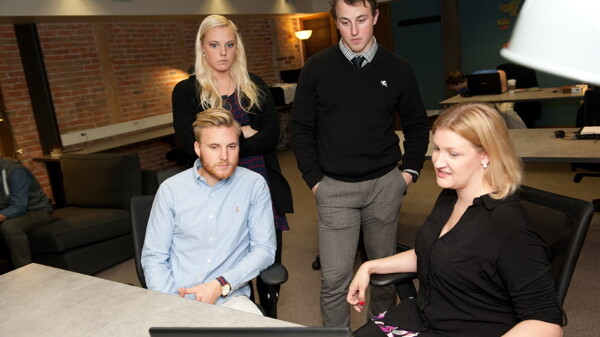Coworking Collaboration
UW-Eau Claire partners with WorkSpace to give entrepreneurship students a taste of coworking

entrepeneurship program.
The business world is in the middle of a transition from giant, elaborate corporate structures to smaller, entrepreneurial ventures and innovative startups. With that change comes a shift in work mentality as well. No longer is business just about putting time in, chasing promotions, comparing fantasy football teams in the break room, and developing carpal tunnel and eye strain from creating monotonous spreadsheets. Now, more and more, people are clamoring for the jobs they want and if those jobs don’t exist, they create them and do it anyway.
And right now, the UW-Eau Claire College of Business recognizes that trend and is developing ways to nurture the entrepreneurial spirit in its students. But where do startups and entrepreneurs – especially those straight out of school – get their start? Coffee shops? The public library? Their parents’ basements?
Perhaps, but that’s the reason coworking spaces exist: To provide a professional business space for workers whose jobs don’t demand a specific office setting.
Coworking spaces have been popping up around the world over the last five years, providing some relief for freelancers and entrepreneurs.
"If you’re going to bring an idea to a market, you have to find capital; everybody’s got to come up with a plan. There’s some commonalities that everybody goes through to go from an idea to a real business. Well, here they have the opportunity to discuss that with people who are going through the same thing."
– Diane Hoadley, UWEC College of Business dean, on the value of collaborative co-working spaces for budding entrepreneursAt their core, coworking spaces are just rentable office space with several perks you can’t get if you rent on your own – things like high-speed wi-fi, shared printers, furniture, coffee, meeting rooms, and more. But there is something much more than that. Coworking spaces provide a community for independent workers to join into and potentially collaborate with.
The recent coworking concept started in San Francisco in 2005 with The Hat Factory, a collaborative space for tech workers, and has since grown to over 700 coworking spaces in the United States and many more worldwide.
The UW-Eau Claire College of Business is partnering with WorkSpace, a coworking space housed at the Volume One World Headquarters, 205 N. Dewey St., Eau Claire, to give its entrepreneurship students a taste of the flexibility and opportunity that coworking spaces provide for a yearlong experiment.
Diane Hoadley, the dean of the College of Business at UW-Eau Claire, said the opportunity to get students into a coworking environment will not only give them a place off campus to get their stuff done but also get them in the same room with area professionals (who are also using WorkSpace for their own businesses) in a place offering a unique, useful collaborative environment.
“The reason I’m excited about the Volume One spot is we’re going to have a space where many students are going to be able to work together at the same time,” Hoadley said. “What I need is a spot where students can work with different people present in the community and doing like things. If you want students to get a good understanding, you’ve got to get them involved.”
Blair Foley is a quantitative marketing consultant – and current WorkSpace user – who specializes in helping startups get their data together to talk to investors and optimize their growth on tight budgets. Foley, a Menomonie native, is a prime example of what the College of Business/WorkSpace partnership is all about – getting students mingling with professionals who could help them out.
“The WorkSpace can be a nice natural gap between academia and being part of the community,” Foley said. “It’s a nice way for small, new companies to provide a more normal social environment for their employees and meet other unique and independent talent.”
And even without professionals like Foley present, Hoadley said getting students, young professionals, new startups or fresh entrepreneurs who are in the same boat – trying to find capital, formulating a business plan, etc. – in the same room and working together as a team is going to be more effective than if each had gone about it alone.
“If you’re going to bring an idea to a market, you have to find capital; everybody’s got to come up with a plan. There’s some commonalities that everybody goes through to go from an idea to a real business,” Hoadley said. “Well, here they have the opportunity to discuss that with people who are going through the same thing.”
In a sense, coworking works better in a smaller community such as Eau Claire that generally lacks a bevy of corporations with harsh structuring, and this collaboration could be a signal for the future of business, and not just here.
“I do think coworking spaces are here to stay,” Hoadley said. “I certainly applaud Eau Claire for figuring that out early.”
You can find out more information about WorkSpace at VolumeOne.org/workspace or by calling (715) 552-0457


















